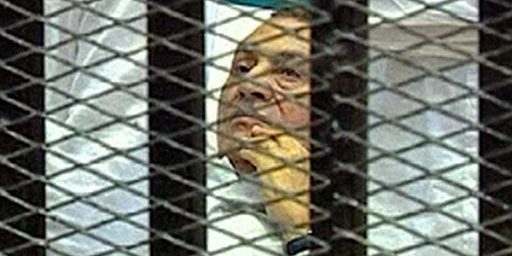Revolutions are Rare
If Mubarak is driven from power, will that make Egypt a case of "revolution"?
The events in Egypt have been referred to in the press as being a “revolution” (or, at least, a revolution in the making). However, the proper classification (as a manifestation of understanding) will have to wait, as we are far from revolutionary change in this case. Indeed, the precise endgame is not even knowable at the moment.
Indeed, to date all we have seen is Egypt are mass demonstrations that have generated some amount of political concessions from the regime, which is no small feat (although how big a feat it is remains to be seen). Consider the following list:
- The appointment of a Vice President. This is significant because it creates a viable transition figure within the current government. Of course, the appointment itself does not mean that such a power transfer will actually take place. The appointment also created a specific spokesperson for the regime in the midst of the crisis that isn’t Mubarak, which is a significant tactical move, as well as a practical one, politically speaking.
- Mubarak’s promise not to run for re-election in September. This at least opens to door for new leadership (although September is a long way away at the moment).
- The resignation of Mubarak and his son from leadership roles in the National Democratic Party. This at least suggests some change in power structure (I choose the word “suggests” rather specifically).
- Talks with the opposition. It’s a start.
- A promise to lift the emergency laws. These have been in place since 1981 and if they are lifted would, at least in theory, allow for some political opening. Of course, the promise is only triggered if peace is restored to the streets.
Now, every one of the above is significant, although it is worth pointing out that they are all either promises about the future and/or reversible.
None of this is revolutionary—not by a long shot. Even if Mubarak decides to get on plane during this evening and leaves for good, that act, dramatic though it would be, would not a revolution make.
The question about whether or not there is a revolution is predicated on the question not of whether a given leader is removed, or even if there is some change to the nature of the regime (such as a movement to a more democratic system or even towards some other kinds of authoritarian regime).
A key question in the Egyptian case will be: how radical will be the transformations of the institutions of the state and the basic social order? If there is no radical change in those arenas, there will be not revolution. At the moment there are zero guarantees of institutional or societal guarantees—indeed, no clear path to even tweaking said structures.
Ok, so what would a revolution look like? I have always been partial to Samuel Huntington’s definition of revolution:
A revolution is a rapid, fundamental, and violent domestic change in the dominant values and myths of a society, in its political institutions, social structure, leadership. and government activity and policies. Revolutions are thus to be distinguished from insurrections, rebellions, revolts, coups, and wars of independence. A coup d’etat in itself changes only leadership and perhaps policies; a rebellion of insurrection may change policies, leadership, and political institutions, but no social structure and values; a war of independence is a struggle of one community against rule by an alien community and does not necessarily involve changes in the social structure of either community. What is here called simply “revolution” is what others have called great revolutions, grand revolutions, or social revolutions. Notable examples are the French, Chinese, Mexican, Russian, and Cuban revolutions.
Revolutions are rare.*
To that list one can add Nicaragua and Iran (Huntington originally wrote the above in the 1960s, hence they were not listed). There is also a question to how to deal with the events in Eastern Europe in the wake of the collapse of the Soviet Union, but I will leave that aside for this discussion (for example, how to classify the Velvet Revolution in Czechoslovakia).
I will note, however, that things that are called “revolutions” in recent times comes nowhere near to qualifying, such as the “Orange Revolution” in Ukraine or the “Cedar Revolution” in Lebanon (as well as any number of other “color” revolutions). Mass protests that result in some amount of political concession does not a revolution make. Indeed, to take the Lebanese example, can anyone even say that pre- and post-Cedar Revolution Lebanon are especially different places?
The likelihood from these events has always been some form of continued authoritarianism with the main question being whether Mubarak stayed or not (as Mubarak’s exits does not, by any stretch, guarantee democracy). The hope (at least from my perspective and the perspective of many) was that these events would create an opportunity for democratization in Egypt (although instant democracy has always been rather unlikely). There has also been a fear of an Iran-like outcome, but this seems unlikely
At a minimum it seems clear that the military remains a viable institution (not to mention that military men remain in positions of power). As such, not only is revolution unlikely, so too is total regime breakdown unlikely as the coercive power of the state appears intact.
The question to me remains as to what degree the military’s disposition (its attempt at appearing neutral) is a function of policy by the Mubarak and his allies within the regime or simply the military itself biding its time.
* From page 264 of Samuel Huntington, Political Order in Changing Societies (2006 edition).







A very helpful post. Clarifying. Thanks.
“Notable examples are the French, Chinese, Mexican, Russian, and Cuban revolutions.”
Which Chinese Revolution is he talking about?
I can think of dozens of potential ones over the past 4000 years.
@Michael: Thanks. I appreciate you saying so.
@ponce: The Chinese Revolution of 1949.
I suggest “revolt” would be a more accurate term for what we are currently observing. I’m not sure an actual revolution could occur without far more bloodshed.
“@ponce: The Chinese Revolution of 1949.”
Hmmm, not sure I follow.
There have been countless instances of tyrants brutally forcing changes on societies.
Wouldn’t you have to count the American Civil War(eradication of slavery) as a “revolution” under that definition?
The most common usage of “the Chinese Revolution” refers either to the revolution of 1911 that overthrew the emperor or Mao’s final consolidation of power in 1949. IMO the Chinese Revolution began in 1911 and continued, at varying levels of intensity, until 1949.
Of course, I’d accept Huntington’s definition. The follow-up question is what events would turn what’s going on now into a full-fledged revolution?
I think it would require some combination of the following:
1. The Muslim Brotherhood and other genuine boots-on-the-ground opposition parties refuse to accept any member of the present regime as a transitional leader.
2. The military fractures with some portions supporting the regime, others opposing the regime, and, possibly, yet others supporting differing figures within the regime or differing non-regime individuals.
3. The transitional government is unable to produce enough progress fast enough to satisfy anybody.
4. The Mubarak regime decides to hold onto power by whatever means necessary (which might well precipitate #2).
5. Ethnic, regional, religious, or factional issues come to the fore.
The problem with that formulation is that it is an action from above (i.e., via a tyrant). Further, the issue is not just change, but a specific type of change.
No–it did not create the overarching changes that the definition describes.
A reasonable position.
Eliminating slavery as an economic system and freeing the slaves wasn’t a big change to America?
We’re still dealing with the repercussions from these changes 160 years on.
Mao’s changes by comparison are considered a brief, hideous deviation best forgotten just 60 years later in China.
Mao’s changes by comparison are considered a brief, hideous deviation best forgotten just 60 years later in China.
Good point. The People’s Republic today resembles more Chiang Kai-Shek’s vision of a prosperous China with a strong central government than Mao’s permanent revolutionary state. It has been said that Chiang would definitely recognize the PRC today as he envisioned China would become.
@ponce:
I think you are missing the basic point, which is that not all changes, even important and dramatic ones, are “revolutions”–check out the definition above again.
Note: to not want to call the results of the Civil War a “revolution” is not to want to diminish the significance of the events, but rather to state that the term in question is simply not applicable.
Not all major changes are revolutions.
Ponce,
Ending slavery did not present a major attempt to transform American society. Quite the contrary.
What resulted was the extension of the rights and responsibilities of the existing system to greater numbers of people while the political order (i.e. The Constitution) continued to function largely as it had the previous seventy-six years.
In essence one can argue America did not fundamentally change with emancipation, it only became more itself.
@ponce and DC Loser:
But the relevant question would not be “what is China like in 2011” but rather “what changes was Mao able to put into place as a result of the revolution?” The bottom line is that the changes in question were profound and deep and altered the social, economic and political make-up of China.
And, btw, whether one thinks those changes were good, bad or indifferent isn’t the issue.
@Steve – Your response reminds me of the quote often attributed to Zhou En-lai when he was asked for his assessment of the French Revolution – “It’s too early to tell.”
“…while the political order (i.e. The Constitution) continued to function largely as it had the previous seventy-six years.”
With a little help from the 13th, 14th and 15th Amendments.
“what changes was Mao able to put into place as a result of the revolution?”
So Cambodia under Pol Pot and the Khmer Rouge was a revolution?
It sounds as if the American Revolutionary War might not qualify as a revolution under a strict definition.
@Peter:
I think it is far better understood as a war for independence.